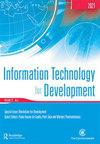互联网发展对中国地级市绿色全要素生产率的影响
IF 5.1
3区 管理学
Q1 DEVELOPMENT STUDIES
引用次数: 0
摘要
本文章由计算机程序翻译,如有差异,请以英文原文为准。
The impact of internet development on green total factor productivity in China’s prefectural cities
ABSTRACT This paper uses the global Malmquist-Luenberger index to measure the effect of Internet development on the green total factor productivity (GTFP) of China’s 283 prefectural cities. We find that by promoting high-quality development, the effect of Internet is significantly positive. Firstly, we explore the two mechanisms through which the use of the Internet promotes GTFP: improvements in the quantity and quality of urban innovation and the advancement and rationalization of urban industrial structures. Secondly, we compare the pre- and post-impacts of the Internet + initiative from which it draws critical policy implications. Finally, threshold regression shows that when urban Internet penetration and employee wages rise to their respective threshold levels, the promotion effect of the Internet on GTFP can be further augmented. Meanwhile, from the perspective of Intensive Growth Theory, the Internet’s contribution to green labor productivity is more pronounced.
求助全文
通过发布文献求助,成功后即可免费获取论文全文。
去求助
来源期刊

Information Technology for Development
Multiple-
CiteScore
11.30
自引率
16.70%
发文量
34
期刊介绍:
Information Technology for Development , with an established record for publishing quality research and influencing practice, is the first journal to have explicitly addressed global information technology issues and opportunities. It publishes social and technical research on the effects of Information Technology (IT) on economic, social and human development. The objective of the Journal is to provide a forum for policy-makers, practitioners, and academics to discuss strategies and best practices, tools and techniques for ascertaining the effects of IT infrastructures in government, civil societies and the private sector, and theories and frameworks that explain the effects of IT on development. The concept of development relates to social, economic and human outcomes from the implementation of Information and Communication Technology (ICT) tools, technologies, and infrastructures. In addition to being a valuable publication in the field of information systems, Information Technology for Development is also cited in fields such as public administration, economics, and international development and business, and has a particularly large readership in international agencies connected to the Commonwealth Secretariat, United Nations, and World Bank.
 求助内容:
求助内容: 应助结果提醒方式:
应助结果提醒方式:


